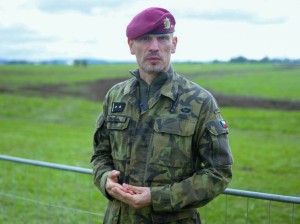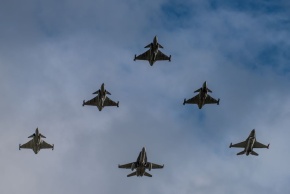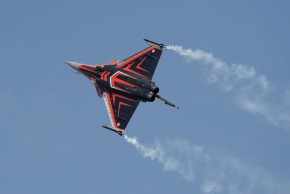News
Six paratroopers in the middle of nowhere, far from everything, and a hundred Afghans // HoND
We probably don't need to introduce Colonel Ivo Zelinka at length. It can be said that he is one of the most famous Czech soldiers. At the time of our interview, he was a lieutenant colonel and deputy commander of the 43rd Airborne Regiment in Chrudim. In November 2022, he became an adviser to the Minister of Defense Jana Černochová, which also brought him a promotion to the rank of colonel. Since January 2023, he has been the head of communications of the General Staff and thus one of the main faces of the Army of the Czech Republic.
But what were his beginnings in the army? How is the paratrooper training, what was his most difficult mission and how did he cope with being separated from family? What funny story did he bring back from Afghanistan and what does he say to those who are thinking about a career as a paratrooper? Read on.
What was your path to the military?
I studied at the civil grammar school in Kutná Hora and already in the second year I decided where I would continue. That really set me apart, because most of my classmates submitted three, four, maybe five applications. I applied for exactly one for one specific field, namely the Military University of the Ground Forces, field of reconnaissance. And then I graduated here.
As part of my studies, I completed the US Army Rangers School, a course for American special forces, in my second year. This led me to join the paratroopers after completing my bachelor's degree. That was probably the closest unit to the one in America.
So, you already had excellent training from your studies, but how does the further training of paratroopers in the units go?
It's a long-term thing. It can be said that it takes at least two years to be operationally usable, more like three. First, they have to meet the conditions of the selection procedure. This is conceived as a three-day event and half of the people will make it, half will not, and these are people who meet all the conditions to become a soldier of the Army of the Czech Republic and have already completed basic training.
They then go to eight weeks of additional intensive training to take them from the standard of a regular soldier to the level of a paratrooper, primarily in two basic areas, which are tactical and marksmanship training. We deal with other things there, but these two are the most important. And when they manage the eight weeks, there is a basic paratrooper course, where they learn to jump with a parachute and paratrooper activities in general.
After these three stages, he gets the right to wear the red beret. If you see someone who is in Chrudim and is not wearing a red beret, but a field cap, it is not because he has forgotten the beret, but he is not yet entitled to a red headdress.
If the three-day selection process is so difficult even for an ordinary soldier, can you reveal what it contains?
It's a combination of physical exertion and mental toughness testing, all in a group dynamic. It includes long transfers, entry athletic testing, we find out their ability to swim in a basic way. There are also psychotests, and at a certain stage the candidates evaluate themselves and their team. In contrast, we do not test any military skills there. It's designed to be something that a healthy, motivated athlete with no background in the military can handle. Military skills will only be learned after we select him.
Which of these is the most difficult for applicants? Which part will most people not pass through?
The Royal Discipline, as we call it, is the accelerated weighted movement. In it, the contestants run with a gun, a backpack full of equipment and in a group over a distance of ten kilometres, while they have a time limit. This is a great physical and mental burden. If someone is not keeping up, holding up the group, he doubts whether the whole group will be eliminated because of him. Some give up for psychological reasons or simply collapse. It's a really tough discipline. If someone doesn't have this resilience, they will be in trouble.
Are there many people who want to become a paratrooper?
Fortunately, yes. We recruit from two sources. On the one hand, these are people who are already serving in the army, it doesn't matter where. If they are motivated and have the prerequisites to become a paratrooper, we will welcome them to the selection process, and if they pass it, they can join. The second, larger share are people who come straight from civilian life. They decide that they want to serve with the paratroopers, go through the recruitment process and basic training and are accepted to us conditionally. They have to pass the selection procedure at least on the third attempt. When they do that, they go through the rest I mentioned. If they don't make it, they can still serve in the military, but unfortunately, they won't be paratroopers in this life. They have to join another unit.
Let's get back to you personally. You have completed several missions in your military career. Which one was the hardest?
I have been to Afghanistan three times, but the most difficult was my last deployment. This was the only mission that had a combat character, and thus it was completely different from the previous ones. Those weren't easy either, but this one was harder in that there were six of us paratroopers in the middle of nowhere, far from everything, and a hundred Afghans with us. We had to eat with them, live with them, sleep in their base, train with them and fight with them in their operations.
In addition, the support of NATO forces there was dramatically lower than in the operations in which I commanded an airborne company, when we did three-day helicopter operations over the mountains. This is something completely different, because you have people around you that you can rely on 100%. Well, it didn't quite work out there. That was probably the most difficult deployment I have ever experienced.
What was the most challenging part of the mission?
We were never afraid of not succeeding in a shootout. These were happening almost every week, but we knew that the Taliban were bad shooters and we were good shooters, we could cover and so on. Rather, we were worried about explosive traps, which threatened us significantly more than in previous deployments, because in the company of those Afghans, we were a target from the Taliban's point of view. It was a less trained force, there is a difference between a hundred Afghan National Army soldiers and a hundred paratroopers, and of course the Taliban knew it.
And then the logistical part was also difficult. As I mentioned, we lived there with them, we did not go anywhere, not even to any allied base. We lived in such a small tent, we ate their food, we were exposed to the same dangers as them. A large part of those firefights were night raids on the base. It was almost a golden rule that it would happen at least once a week. So that was the hardest part.
So, the work is also very mentally demanding.
Yes, but it's also manageable because I was there with five other great paratroopers that I've known for years and years. So, we were a really tight-knit team that supported each other in everything. It was good. It's not like going out with five random strangers, that would be terribly difficult mentally. Paradoxically, it was quite possible this way.
|
|
How can you handle being separated from family during such a mission?
One has to be extremely focused on the task at hand in those situations and has little time for other thoughts. That helps a lot, definitely. There, the whole life has a clearly defined order, and one deals only with the important things that may mean that someone does not return from the task, and not whether the washing machine broke at home.
Obviously, some of the details of these missions are impossible to talk about, but do you have an interesting experience that you can share with us?
I will tell you a funny story. It was my second deployment to Afghanistan where my reconnaissance platoon, which was made up of paratroopers, and I did a lot of helicopter missions. Typically, we would be dropped off somewhere in the mountains at night, explore for three days, and then be brought back. The drop-off was typically in areas that we chose based on aerial photographs. Predator drones took pictures of it, we assessed if the helicopters could land there, and then they dropped us there at night.
The same thing happened in the mountain district of Azra, not far from the Pakistani border, where they dropped us off in such a field. Just after dawn, we found out that it was a three by one and half kilometre cannabis field, it took us two hour to get out. It was quite a strange experience to be dropped in the middle of a field of marijuana.
You are currently also active on social networks. Does your superiors mind?
It depends. I can't say there's never been a raised eyebrow, or an occasional question or wonder why that way. I always try to explain to them that the message and the medium must fit together. The same message would be different in Lidové noviny, different on Facebook and different on Twitter, because 280 characters are 280 characters. Therefore, there must be brevity, simplification, and so on. The worst tweet is the one that no one cares about. There is an effort to make it have some impact. Even at the price that it may mean raised eyebrows.
And a final question, what would you say to those interested in becoming a paratrooper?
So that they are not afraid of it. I graduated from a completely ordinary civilian grammar school, and my only assumption that I was headed in that direction was that I went to the Boy Scouts. I enjoyed the outdoors and I was definitely not born into a military family. But it was something that I set as a goal and I gradually pursued it. Whether it was the fact that I learned more English because of it, I focused my sports in a specific direction, or I went to math tutoring, which I saw that I was not good at, I didn't enjoy it, but I knew that in two years I would make it receipts. Persistence is important there, and if someone sets it as a goal, he can do it.























